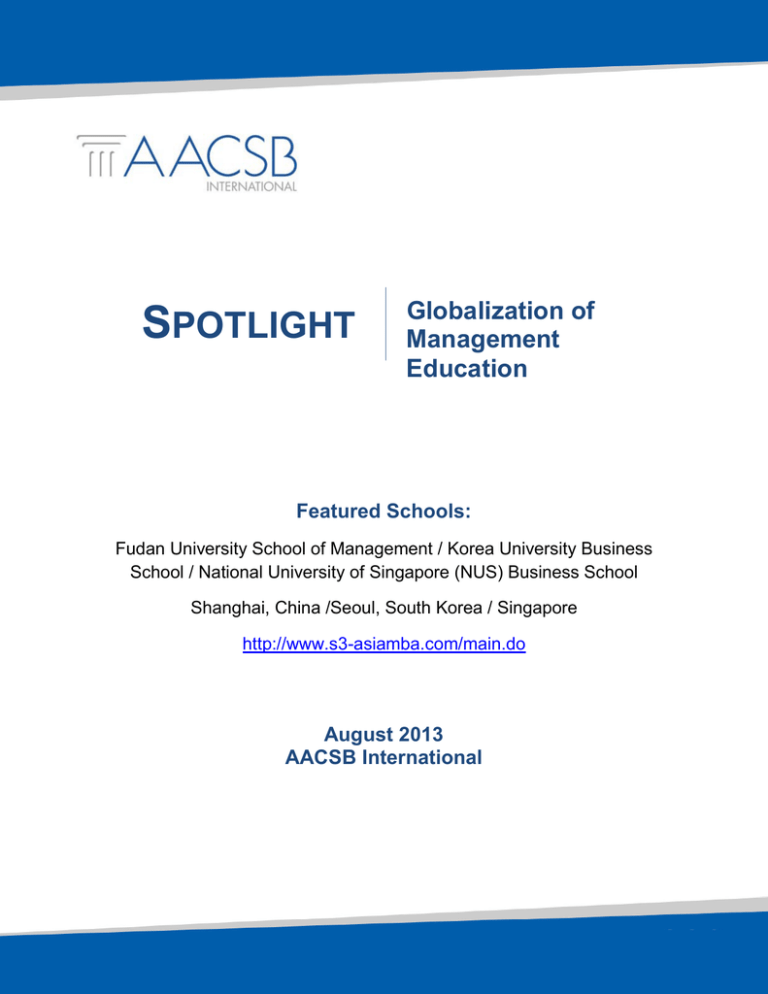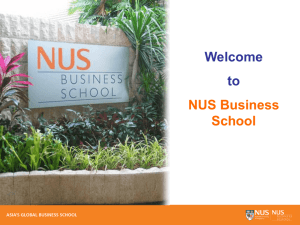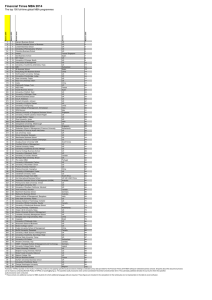
SPOTLIGHT
Globalization of
Management
Education
Featured Schools:
Fudan University School of Management / Korea University Business
School / National University of Singapore (NUS) Business School
Shanghai, China /Seoul, South Korea / Singapore
http://www.s3-asiamba.com/main.do
August 2013
AACSB International
SPOTLIGHT| Globalization of Management Education
S³ Asia MBA |2
S³ Asia MBA Program
With the growing importance of Asia to the global economy, Asian business schools are increasingly
realizing how necessary it isto prepare their students for a multi-focal, globalized business environment.
For the past five years, a consortium of three of the foremost business schools in Eastern and SouthEastern Asia has put together a unique, collaborative MBA program that accomplishes this very goal,
while maintaining the educational focus on the rising stars of Asia.
According to Ernest Chng, Senior Manager of International Relations at the National University of
Singapore (NUS) Business School, the idea for this program first originated in 2005 at a centennial
celebration for Fudan University, Korea University, and NUS, when officials from the three schools initially
met and conversed. Sun Long, Executive Director of International MBA Programs at the Fudan University
School of Management (FDSM), says that though their meeting was largely by chance, it proved
extremely serendipitous, not only for the three schools but for the students that have benefitted from their
collaboration.
The universities founded the S³ University Alliance (S³UA) and sealed it with the Seoul Declaration for
Collaboration at the Tri-University Colloquium in
Seoul on May 19, 2006. The name of the program,
S³ Asia MBA, is derived from the first letter of the
three cities where the business schools are located:
Shanghai, Seoul, and Singapore. The program
admitted its initial cohort in 2008.
How the S³ Asia MBA Partnership Works
According to Director Sun, the three partners share common values and opinions on education and
development. He stresses the importance of these shared outlooks to the functioning of the S³ Asia MBA,
since the three schools each contribute equally to instruction, curriculum development, and the annual
student cohorts. Keeping harmony among the partners was and is very important to the success of the
program, he says, so the vision for the S³ Asia MBA was solidified well before the program began.
Additionally, the three partners agree that since they are all AACSB-accredited, none have to worry about
differentials in quality.
Director Sun also indicates that the program managers from each partner school meet regularly three to
four times per year, when each class starts (its inauguration at FDSM prior to the beginning of the first
semester) and then at each of the partners' orientation sessions for the students. At these times, he says,
they discuss things such as any needed curricular adjustments for the coming year, career services
collaborations and how resources from each schools' career development office can be pooled to better
support S³ Asia MBA students, etc.
© AACSB International. All Rights Reserved.
SPOTLIGHT| Globalization of Management Education
S³ Asia MBA |3
Senior Manager Chng says that each school is responsible for administering all aspects of the S³ Asia
MBA for the segment of the program that it has agreed to host. The main office for the S³ Asia MBA
program is established in Korea University Business School (KUBS), and this office is responsible for
coordinating the operations and maintaining all the records for the program, he says. Although the
operating costs are borne by KUBS throughrevenue earned from candidates recruited by KUBS, the
common advertising and promotions cost of the program is shared equally amongst the three partner
schools. Director Sun stresses that "the major move of this practice is not from the profit side. It’s mostly
about the idea and the vision that we should collaborate and cultivate the Asian leaders, as something
only we can do."
Students are admitted to a "home university" based on the geographical region from which the applicant
is a citizen, according to Director Sun. He says that students from outside Asia can choose which one to
apply to, and students pay tuition fees only to their home university throughout the program. Any
imbalance is settled at the end of each intake through cross-institutional charging, based on a pre-agreed
per-student rate amongst the three institutions, according to Senior Manager Chng. The two of them and
Yong Keun Yoo, Academic Director of the S³ Asia MBA Program at KUBS, all indicate that each partner
admits its own portion of the student cohort to the program using their own admission requirements,
though their requirements are similar:
School
Entrance Exam Requirements
Work Experience
Requirement
FDSM
Chinese national entrance examination (GRK) required for any Chinese
passport holders living in or outside China
GMAT required for non-Chinese students who want to apply for an FDSM
degree
3 years
GMAT recommended for Korean, Japanese and international students (for
Chinese students, GRK can substitute)
Official English Proficiency test score required if applicant is not a graduate
from English-speaking countries
2 years
GMAT required for all NUS degree applicants, including those seeking their
second degree from NUS
2 years
KUBS
NUS
*Qualified applicants are interviewed in English at their respective business schools, and the interview
outcomes are accepted for all three schools.
Director Sun says that the partners look for candidates that can survive in a very diversified setting, and
are open-minded enough to share with and to challenge other students in the class.
How the S³ Asia MBA Program Works
Each of the three partners contributes about 10 students to each cohort, totaling approximately 30
students in the program, per cohort. Director Yoo states that going forward, all three schools plan to
© AACSB International. All Rights Reserved.
SPOTLIGHT| Globalization of Management Education
S³ Asia MBA |4
recruit one more student for each year, slowly increasing the size of the S³ Asia MBA cohort by three
persons per year. Upon the successful completion of the program, students are awarded two MBA
degrees: one from each student's home university and one from their choice of a second university from
among the three partners. Graduates also receive an S³ Asia MBA program certificate signed by all three
deans from FDSM, KUBS, and NUS Business School.
Each cohort progresses through three semesters, one taught at each of the three partner schools.
1
Students undergo orientation at the start of each semester, to familiarize themselves with each campus
and its facilities. Students have until the start of their final semester to make up their minds about which
partner they want their second degree from, according to Senior Manager Chng. Director Sun notes that
the curriculum at each partner is carefully coordinated by the program managers from the three schools,
to build on that which the student cohort has learned in previous semesters, and that each semester
includes at least one context-specific field trip and/or internship opportunity.
2
The S³ Asia MBA program is taught entirely in English; however, students who do not already speak the
local language at a given partner school have the opportunity to take basic language courses in Chinese
and Korean as well, in a non-credit capacity. FDSM students are also required to take a degreecompulsory course in Advanced Business English during their semester at NUS, which is optional for
KUBS and NUS students.
3
The first semester takes place in Shanghai, and runs from September to December. It is at FDSM that the
students undertake their foundational core courses, as well as a course on doing business in the Chinese
context. During the months of January and February, the class breaks to allow students to pursue
internship opportunities, and/or take the aforementioned non-credit language courses.
4
After the break, they spend the months of March through June in Seoul, where they continue taking core
coursesat KUBS, as well as a course on doing business in the context of Korea and Japan. The third
semester at NUS in Singapore runs from August through the end of November. This semester allows the
students to pursue their final core courses, includinga course on doing business in the broader context of
Asia and the Pacific, as well as a few elective courses. Finally, those students whose home university is
Fudan, as well as any KUBS and NUS students who elect to earn their second MBA degree from FDSM,
must subsequently return to Shanghai for a fourth and final semester in order to write and defend their
master's thesis.
5
Director Sun says that S³ Asia MBA students are afforded opportunities to fully participate in each
university’s student life, activities, and clubs, etc., and they also have full access to each partner school's
resources while they are on campus. Senior Manager Chng indicates that those who graduate become
alumni of both the universities from which they earn a degree, retaining access to those schools' career
© AACSB International. All Rights Reserved.
SPOTLIGHT| Globalization of Management Education
S³ Asia MBA |5
services and alumni networks. Additionally, says Director Sun, "The students can benefit from this kind of
collaboration. It’s almost the only one like it in the market. It is very deep. It is a great experience."
Acknowledgements: AACSB International is grateful for the assistance of Ernest CHNG, Senior Manager
of International Relations at the National University of Singapore Business School; SUN Long, Executive
Director of IMBA Programs at Fudan University School of Management; and Yong Keun YOO, Academic
Director of the S³ Asia MBA Program at Korea University Business School.
© AACSB International. All Rights Reserved.
SPOTLIGHT| Globalization of Management Education
S³ Asia MBA |6
End Notes
1
S³ Asia MBA. (2013) Tri-Semester Curriculum web page. Electronic document, http://www.s3asiamba.com/listener.do?layout=experience.03, accessed August 14, 2013.
2
Fudan School of Management, Fudan University. (2013) Empowering Asia, Empowering MBA web page. Electronic
document, http://www.fdsm.fudan.edu.cn/S3/en.html, accessed August 15, 2013.
3
NUS Business School, National University of Singapore. (2013) S³ Asia MBA Curriculum web page. Electronic
document,
http://bschool.nus.edu.sg/TheNUSMBA/ProspectiveStudents/DoubleDegreeProgrammes/S3AsiaMBA/ProgrammeI
nfo/Curriculum/tabid/2316/default.aspx, accessed August 15, 2013.
4
NUS Business School, National University of Singapore. (2013) S³ Asia MBA Programme Schedule web page.
Electronic document,
http://bschool.nus.edu.sg/TheNUSMBA/ProspectiveStudents/DoubleDegreeProgrammes/S3AsiaMBA/ProgrammeI
nfo/ProgrammeSchedule/tabid/2317/default.aspx, accessed August 15, 2013.
5
S³ Asia MBA. (2013) Dual Degree and One Certificate web page. Electronic document, http://www.s3asiamba.com/listener.do?layout=experience.02, accessed August 14, 2013.
© AACSB International. All Rights Reserved.





